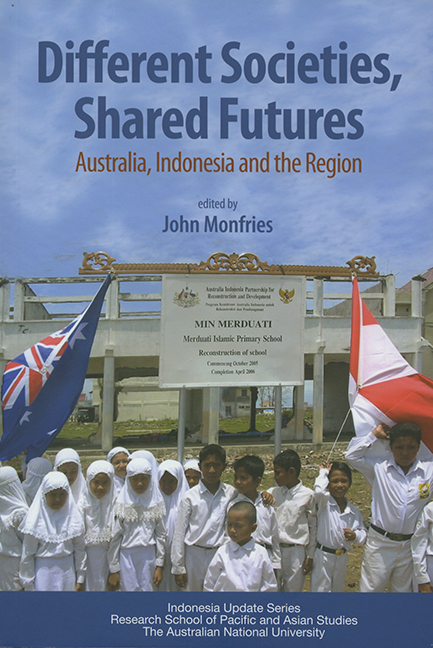Book contents
- Frontmatter
- Dedication
- Contents
- Tables
- Figures
- Contributors
- Acknowledgments
- Opening Address by Richard Woolcott AC
- 1 Introduction
- PART I Regional Viewpoints
- PART II Security Aspects
- PART III Mutual Perceptions and Irritations
- 7 Strange, Suspicious Packages
- 8 The Indonesian Student Market to Australia: Trends and Challenges
- 9 The Centrality of the Periphery: Australia, Indonesia and Papua
- PART IV The Economic Partnership: Aid, Economics and Business
- PART V Conclusion
- Glossary
- References
- Index
7 - Strange, Suspicious Packages
from PART III - Mutual Perceptions and Irritations
Published online by Cambridge University Press: 21 October 2015
- Frontmatter
- Dedication
- Contents
- Tables
- Figures
- Contributors
- Acknowledgments
- Opening Address by Richard Woolcott AC
- 1 Introduction
- PART I Regional Viewpoints
- PART II Security Aspects
- PART III Mutual Perceptions and Irritations
- 7 Strange, Suspicious Packages
- 8 The Indonesian Student Market to Australia: Trends and Challenges
- 9 The Centrality of the Periphery: Australia, Indonesia and Papua
- PART IV The Economic Partnership: Aid, Economics and Business
- PART V Conclusion
- Glossary
- References
- Index
Summary
‘There's a worrying emotional element in Australia's relations with its biggest neighbour. It's difficult to portray Australia as racist … Australia has easily accommodated a large number of Asian and other migrants. But the assumption of cultural superiority … from an earlier historical period is too general for the relationship to become easy’ (Rosihan Anwar 2005b).
‘It's a different story to the official one when Australians and Indonesians talk … The message that came out of the talks was stark. Whereas at the top levels of Australia's relationship with Indonesia the feeling might be one of increasing closeness and cooperation, as the politicians keep telling us, below that surface there lingers deep misunderstanding and suspicion on both sides’ (Banham 2005).
This chapter endorses and underlines recent analyses that have suggested a dangerous disjunction between elite and popular perceptions towards Australia and Indonesia, within the two countries. There is much goodwill and cooperation at senior levels of government on both sides; there are sound and increasing people-to-people contacts. But as Patrick Walters wrote in The Australian:
A strange paradox continues to afflict Australia's bilateral relations with Indonesia.
While people-to-people links strengthen year-by-year, opinion polls show a steadily increasing proportion of Australians now nominate Indonesia as our principal long-term security threat. …
They demonstrate that Australian governments still need to address lingering popular perceptions about the long-term direction of Indonesia.
The number of Indonesian students studying in Australia has more than doubled in the past decade. …
Yet by contrast, the number of Australians studying Indonesian at schools and universities continues to fall in the wake of government funding cuts to Asian studies in schools (Walters 2004).
What Patrick Walters wrote in 2004 has been emphasised by events in 2005, including the reactions in both countries to the media circus of Schapelle Corby's trial.
- Type
- Chapter
- Information
- Different Societies, Shared FuturesAustralia, Indonesia and the Region, pp. 69 - 86Publisher: ISEAS–Yusof Ishak InstitutePrint publication year: 2006

